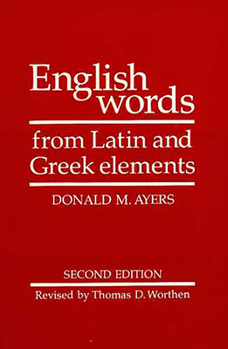English Words from Latin and Greek Elements
Select Format
Select Condition 
Book Overview
Since 1965, Donald Ayers' English Words from Latin and Greek Elements has helped thousands of students to a broader vocabulary by showing them how to recognize classical roots in modern English words. Its second edition, published in 1986, has confirmed that vocabulary is best taught by root, not rote. The importance of learning classical word roots is already acknowledged by vocabulary texts that devote chapters to them. Why a whole book based on this approach? Ayers' text exposes students to a wider range of roots, introduces new English words in context sentences, and reinforces vocabulary through exercises. It promotes more practice with roots so that students learn to use them as tools in their everyday encounters with new words. English Words is written from the standpoint of English; it neither attempts to teach students Latin or Greek nor expects a knowledge of classical languages on the part of instructors. Its success has been demonstrated at both the secondary and college levels, and it can be used effectively with students in remedial or accelerated programs. An Instructor's Manual (gratis with adoption) and a Workbook are also available.
Format:Paperback
Language:English
ISBN:0816508992
ISBN13:9780816508990
Release Date:April 1986
Publisher:University of Arizona Press
Length:312 Pages
Weight:0.97 lbs.
Dimensions:0.7" x 6.1" x 9.2"
Related Subjects
Education & Reference Etymology Foreign Language Foreign Language Learning Foreign Language Study Foreign Language Study & Reference Foreign Languages History Humanities Instruction Language Arts Linguistics Spelling Study & Teaching Vocabulary, Slang & Word Lists Words, Language & GrammarCustomer Reviews
5 ratings
This is a worthwhile book
Published by Thriftbooks.com User , 16 years ago
"This book is a worthwhile, worthwhile, book. It is a very systematic vocabulary-builder,which explains the rules of declension,as well as most, if not all of the common roots of Latin and Greek. I would also reccomend to you Mr Ayers other book: Bioscientific terminology-to go along with this book, and the purchase of one of the dictionaries that he reccomends. Study it: memorize it: master the rules of etymology and your life will be opened up in ways that you cannot begin to understand."
A tremendous asset to teachers and students
Published by Thriftbooks.com User , 21 years ago
This is the book of choice for use in my classroom. Students find it easy to use and understand. For my purposes, I find the book to be logically arranged and clearly written. It is very accessible, and I encourage students, teachers, and philologists alike to use it.Rocco DormarunnoInstructor, College of New Rochelle
Nice Book!!
Published by Thriftbooks.com User , 22 years ago
I found what I have been looking for! A book who extends your English vocabulary systematically. I strongly recommend this book particularly for English learners. (I'm from Turkey)With carefully chosen chapters and exercises, I'm sure you will learn a lot of things about Latin and Greek words in English. I memorized many difficult English words with the help of this book. I want to thank to the authors.Very good book! I read it three times!
Excellent systematic vocabulary builder
Published by Thriftbooks.com User , 24 years ago
As the reviser of this book--not the Photographer (there is not a single picture in the tome)--I must correct a few misimpressions given in the other reviews, while touting the systematic format that separates Dr. Ayers's book from its competitors. To be sure this is a textbook--the best selling text in this subject area--divided into two halves, one dealing with English words derived from Latin, the other dealing with English words derived from Greek. Each lesson has some introductory material; these intros vary: some explain how English builds words from Latin and Greek bases with an explanation of how dictionaries present such information, some are mini-lectures in linguistic processes that characterize English words, some deal with how the form and meaning of words change with time. Each lesson presents a list of bases, prefixes and suffixes for the student to memorize. These are set forth clearly in caps, and there are many examples given for each item. The lesson ends not with quizzes but with words derived from the elements presented in sentences that are written by skilled writers of English. All of the information is well indexed at the end. This systematic approach gives the student control over the most frequently encountered word elements in English coming from Greek and Latin. As a consequence of her studies, such a student will have stored in her brain the keys to about half of the harder words in English including the many thousands of technical words invented each year--especially those medical and biological tongue twisters invented by the biological and medical communities. With the keys in her head and the word in its context before her, the student will often undertand the author without having to look up words that often are not yet even in the most recent dictionary. This is power; but power is not easily gained in any field of endeavor. The book can be used by a diligent person for self-study, but most students will need a structured environment in which to learn its contents. TD Worthen
Pretty good vocab builder
Published by Thriftbooks.com User , 27 years ago
The book was pretty good. It's a little slow as it talks about the origin of the world's languages and kinds of dictionaries there are, but as you progress through the book, it explains the Latin/Greek prefixes, suffixes, and bases of some English words. It does a good job explaining the etymology of some words.






